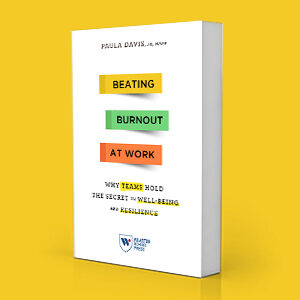Podcast: Play in new window | Download
Subscribe: RSS
 “Burnout” may be one of the most talked about workplace topics these days, & for good reason. According to a recent survey of people in over 40 countries published in the Harvard Business Review, 90% of respondents said their work lives were getting worse during the pandemic – & more than 60% felt they were experiencing burnout often or very often.
“Burnout” may be one of the most talked about workplace topics these days, & for good reason. According to a recent survey of people in over 40 countries published in the Harvard Business Review, 90% of respondents said their work lives were getting worse during the pandemic – & more than 60% felt they were experiencing burnout often or very often.
And while it’s easy to blame COVID for all the distress, the truth is a high incidence of employee burnout had already emerged long before the pandemic began – all around the world.
According to the World Health Organization, burnout is characterized by feelings of chronic stress at work that go unmanaged. And left unaddressed for very long, burnout can have very serious consequences for an individual’s mental health, & is a risk factor for depression, substance abuse & even suicide.
But despite all the harm overly-demanding & overly-stressful workplaces can have on employee well-being, the most common approach companies have employed to defeat burnout so far amounts to providing mindfulness classes & subscriptions to meditation apps. And these, most of us have already discovered, have failed to address the underlying root problem, or solve what’s now become a global epidemic.
No company or leader should place their hopes in the idea that the end of the pandemic will somehow  miraculously restore employee well-being & thriving. What they need instead is a science-based understanding of both the causes & remedies of burnout – exactly the focus of this podcast episode.
miraculously restore employee well-being & thriving. What they need instead is a science-based understanding of both the causes & remedies of burnout – exactly the focus of this podcast episode.
Paula Davis, is the author of the new book, “Beating Burnout at Work: Why Teams Hold the Secret to Well-Being and Resilience” – one that provides actionable strategies for leaders to use in creating cultures which promote resilience, well-being & inherently reduce employee burnout. And cohesive teams, it turns out, just happen to be one of the most powerful remedies to burnout there is.
After seven years of practicing law, Paula melted down under the pressures of her job & quit. She opened up a bakery & was accepted to a pastry school in New York City. After quickly realizing she’d made a colossal career move, she returned to her old job where, predictably, the stress returned immediately & she ended up in the emergency room, twice.
Paula finally quit for good, but this time devoted herself to researching the causes & solutions for burnout. She went on to earn a master’s degree in applied positive psychology from the University of Pennsylvania – and as part of her post-graduate training, she was selected to be part of the UPenn faculty where she taught resilience skills to soldiers as part of the Army’s Comprehensive Soldier & Family Fitness program. The UPenn team has since trained these practices to more than 40,000 soldiers & their family members.
Whether you’re interested in learning how to prevent yourself from burning out, whether you’re interested in learning how to prevent your employees from burning out – or both – Paula Davis has acquired the road map & insight you really need.

